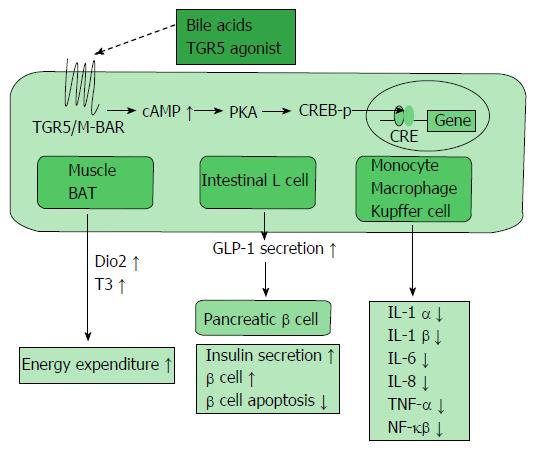Copyright
©The Author(s) 2016.
World J Diabetes. Jul 10, 2016; 7(13): 260-270
Published online Jul 10, 2016. doi: 10.4239/wjd.v7.i13.260
Published online Jul 10, 2016. doi: 10.4239/wjd.v7.i13.260
Figure 3 TGR5/M-BAR-dependent metabolic regulation.
TGR5/M-BAR activation leads to increased intracellular cAMP levels, the activation of PKA and induction of CREB phosphorylation. This series of signaling activity induces the expression of genes bearing CRE and exists in various tissues. TGR5/M-BAR signaling induces energy expenditure in the muscle and BAT, increases GLP-1 secretion in the intestinal L cell, and reduces inflammatory cytokine release in immune cells. CREB-p: cAMP response element-binding protein phosphorylation; Dio2: Deiodinase iodothyronine type II; T3: Tri-iodothyronine; BAT: Brown adipose tissue; GLP-1: Glucagon-like peptide-1.
- Citation: Taoka H, Yokoyama Y, Morimoto K, Kitamura N, Tanigaki T, Takashina Y, Tsubota K, Watanabe M. Role of bile acids in the regulation of the metabolic pathways. World J Diabetes 2016; 7(13): 260-270
- URL: https://www.wjgnet.com/1948-9358/full/v7/i13/260.htm
- DOI: https://dx.doi.org/10.4239/wjd.v7.i13.260









